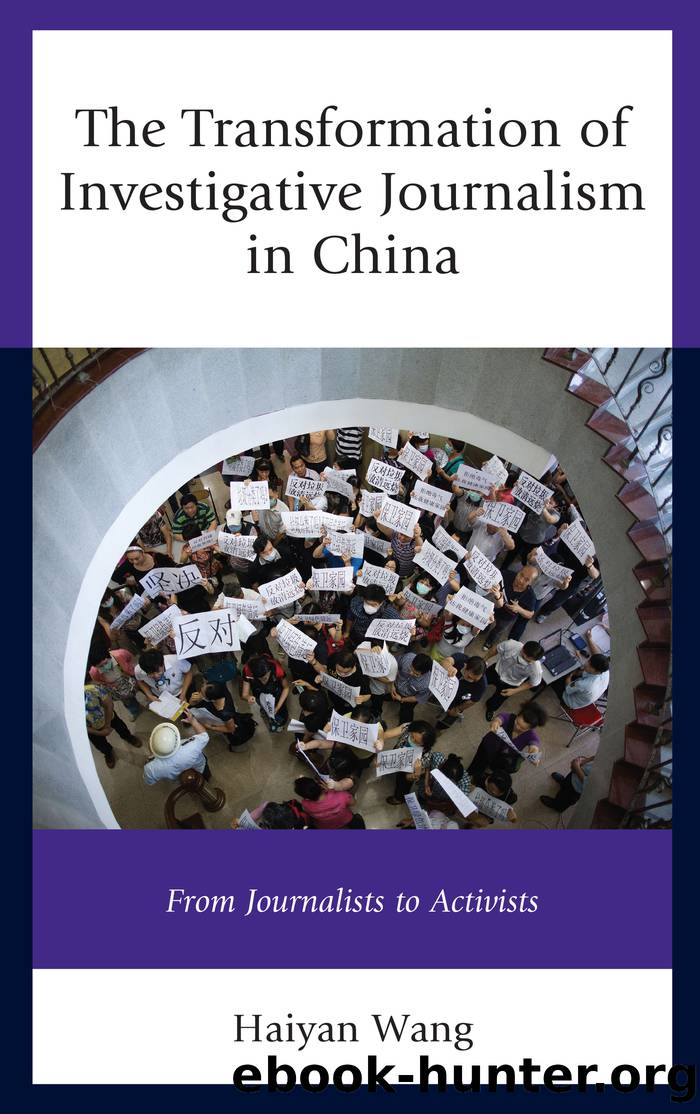The Transformation of Investigative Journalism in China by Wang Haiyan;

Author:Wang, Haiyan;
Language: eng
Format: epub
Tags: undefined
Publisher: Lexington Books
Published: 2012-08-15T00:00:00+00:00
Yet, after having, with some passion, outlined an ambitious role for journalists in actively promoting social change, the journalist seemed to check himself, to remember that he was speaking as an investigative journalist who is supposed to be a âprofessionalâ reporter, which in his understanding meant, first and foremost, being committed to objectivity, neutrality, and impartiality. He continued rather less confidently, shifting to a suddenly different tone and trying to amend what he had just said: âBut of course, whether journalism can solve any social problems is not so important. It is good if it can, but it is OK if it cannot. After all, as professional journalists, our mission is to report and record the facts. Solving the problems is not what we must doâ (cited in Bai, 2012, p. 33).
Luoâs attempt to combine these two roles into a coherent narrative, roles which are in fact incompatible if pursued according to their own logic, therefore failed. They remained distinct; and it was clear that he put much more weight on the former.
Jonathan Hassid (2011) recorded similar experiences in his fieldwork. He found a common pattern recurring again and again over the course of interviews with the journalists. âMany Chinese journalists,â he wrote, âinitially claim to be objective, independent professionals, but when pressed, espouse values incompatible with the normative standards of American journalismâ (p. 820). For example, as he noted, one of the interviewees argued at the beginning of an interview that âthe press should serve as a neutral Fourth Estate and âsupervisor of the party-state,ââ and to illustrate the point he even gave the example of the New York Times and said that his newspaper specifically looked to it for inspiration. But as the interview went on, the journalist began to say something different: he said that it is his belief that âthe press should influence government policy directly,â or to borrow the words of prominent former editor of Freezing Point Weekly, Li Datong, âNews should influence today.â Many other journalistsâ views revealed similar contradictions. Another editor said to him that âif the media are too professionalized, it is a problem.â But ironically, this comment was made just at the end of an interview in which the editor claimed that reporters should be neutral information providers. Hassid (2011, p. 820) thus concluded: âThere certainly are some American-style professionals, driven to present objective facts and include balanced opinions,â but in reality, âmost Chinese journalists are not American-style media professionals.â
This juxtaposition of roles, living with a contradiction in their work, is common enough, even among the most distinguished investigative journalists in China. Wang Keqin, the former China Economic Times reporter, has long enjoyed a reputation as the Chinese âLincoln Steffensâ for a series of muckraking reports that put fear into the hearts of many officials. Yet though these reports roused such emotion, he presents his role, paradoxically, as practicing a kind of machine-like objectivity, arguing that this is both the highest standard of âprofessional journalismâ and the signature of his reporting style.
Download
This site does not store any files on its server. We only index and link to content provided by other sites. Please contact the content providers to delete copyright contents if any and email us, we'll remove relevant links or contents immediately.
Asking the Right Questions: A Guide to Critical Thinking by M. Neil Browne & Stuart M. Keeley(5356)
Autoboyography by Christina Lauren(5086)
Dialogue by Robert McKee(4160)
Eat That Frog! by Brian Tracy(4149)
Sticky Fingers by Joe Hagan(3911)
Journeys Out of the Body by Robert Monroe(3460)
Annapurna by Maurice Herzog(3297)
Full Circle by Michael Palin(3268)
Elements of Style 2017 by Richard De A'Morelli(3235)
Schaum's Quick Guide to Writing Great Short Stories by Margaret Lucke(3187)
The Art of Dramatic Writing: Its Basis in the Creative Interpretation of Human Motives by Egri Lajos(2857)
The Diviners by Libba Bray(2800)
Why I Write by George Orwell(2773)
The Mental Game of Writing: How to Overcome Obstacles, Stay Creative and Productive, and Free Your Mind for Success by James Scott Bell(2766)
In Patagonia by Bruce Chatwin(2755)
Atlas Obscura by Joshua Foer(2705)
The Fight by Norman Mailer(2700)
Venice by Jan Morris(2430)
The Elements of Style by William Strunk and E. B. White(2376)
